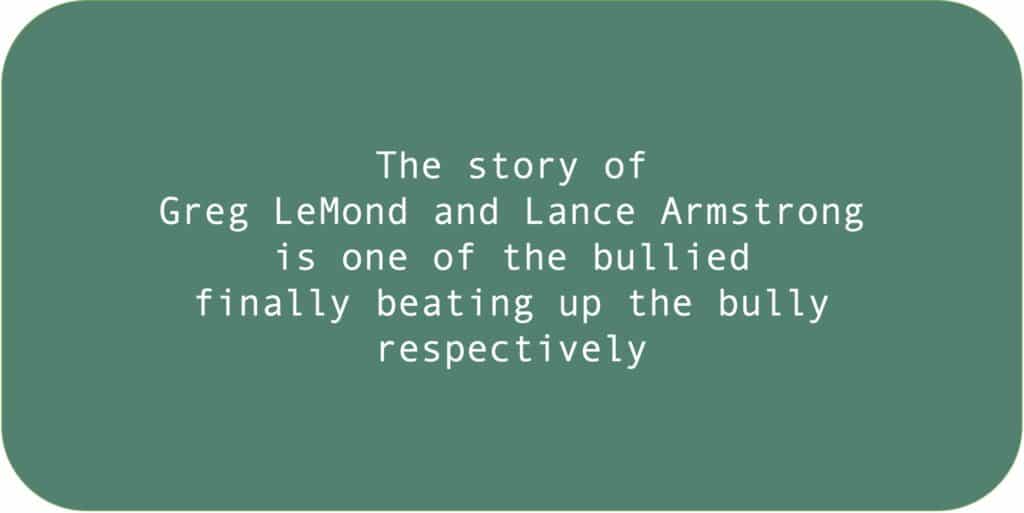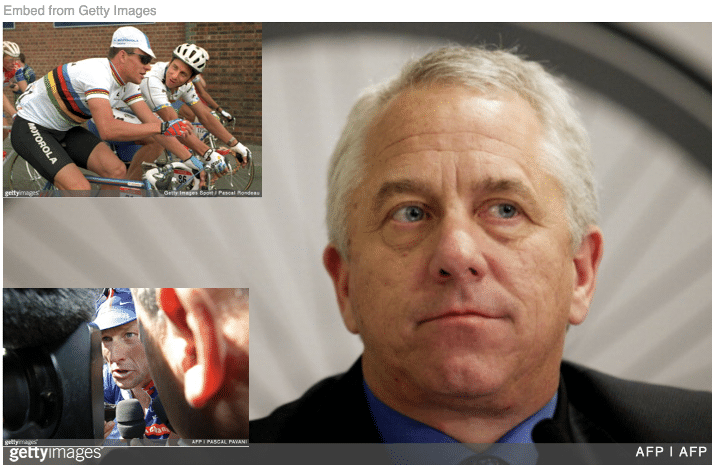
I am not a TV critic. And, unlike many on social media, I have no financial interest in recommending anything on this blog. But I watched ESPN’s 30 for 30: Slaying the Badger on Tuesday night.
It glorifies and vindicates Greg Lemond. He, of course, is best known as the canary who sounded alarms about cyclists like Lance Armstrong using steroids to fuel their way to fame and fortune. But anyone who has any interest in sports must see this documentary film.
Greg Lemond vindicated
But don’t just take my word for it. Because here, in part, is how real TV critic Debbie Emery reviewed it:
The film focuses on Greg LeMond, the first and only American to officially win cycling’s biggest race, and the man who was meant to be his mentor but instead became his tormenter during the 1986 Tour [i.e., pre-Lance Armstrong], five-time champion Bernard ‘The Badger’ Hinault.
‘ESPN was quick to see the value in the story of not only arguably the greatest race in the Tour’s century old history, but one with a rivalry up there alongside Borg versus McEnroe, Frazier and Ali … LeMond-Hinault.’
(The Hollywood Reporter, July 22, 2014)
As movie reviews go, you’ll never read one more enticing than that. But, as the title of this commentary indicates, this film entertains us and redeems LeMond. It dramatizes his message about athletes using their natural abilities – instead of an apothecary of performance-enhancing drugs (PEDs) – to triumph. That’s why the menacing shadow of Lance Armstrong looms in every scene.
Of course, Emery alludes to this shadow. She does this by hailing LeMond as “the first and only American to officially win cycling’s biggest race.” And hers is part of a determined effort to excise the stain and shame of Armstrong from the annals of cycling history.
Lance Armstrong exposed
That effort began in 2012. That’s when the United States Anti-Doping Agency (USADA) stripped Armstrong of all cycling titles. Most notably, that included stripping him of his seven Tour de France championships and all prize money won since 1998.
As with Tiger Woods and golf, I was more interested in Armstrong’s personal story than in cycling. That’s why I never watched Cycling when Armstrong wasn’t competing. Just as I never watched Golf when Woods wasn’t competing.
Armstrong began his improbable comeback from cancer to win it for the first time in 1998. I became a big fan. That is until reports about his doping initiated his spectacular fall from grace. I duly commented in posts like “Lance Armstrong: Falling from Grace” on May 24, 2011, and “Armstrong Exposed as Cycling’s Doper Don” on October 12, 2012.
I’ve written many more commentaries on his rise and fall, each evincing commensurate emotion. But I cite those two because they betray my eagerness to ride along as Armstrong cheated his way to glory. And they show my inclination to help him discredit detractors like LeMond as disgruntled or jealous rivals.
Belated glorification of LeMond
I have long since come to my senses about Armstrong. I’ve repented for hailing him with cult-like admiration. By contrast, this film documents why LeMond is, in fact, worthy of that kind of admiration.

It dramatizes how he won three Tours against seemingly insurmountable odds. But it also chronicles his personal story, which rivals the most compelling part of Armstrong’s (Grimm) fairy tale. For example, he came back from a life-threatening injury of his own to win two Tours – without using PEDs.
To say any more would risk giving away too much of the film. Therefore, I shall end by sharing the overwhelming, even conflicting, emotions I felt after watching it.
I felt joy for having so much of my disillusionment cleansed. Armstrong’s cheating was not the only cause of it. Everyone from Marion Jones to Barry Bonds informed my cynicism. Indeed, I woke up every day expecting to read breaking news about Usain Bolt or Michael Phelps testing positive for PEDs.
I felt regret for joining millions worldwide in heaping praise and adoration upon Armstrong that we should have heaped upon LeMond. Recognizing we can never compensate LeMond for this sensational oversight only compounded my regret. Even this vindicating documentary seems inadequate. Because it’s like seeing a bold, front-page lie corrected in tiny print on an interior page.”.
Nevertheless, I hope LeMond enjoys the vindication this documentary film represents. And I hope people heap more praise and adoration upon him than Armstrong ever enjoyed. You need only juxtapose LeMond cycling to glory in this film with Armstrong finally confessing his sins to Oprah. There can be no better manifestation in sports of good triumphing over evil than that.
So here’s to this image of LeMond cycling becoming his lasting legacy. And to that image of Armstrong confessing becoming his.